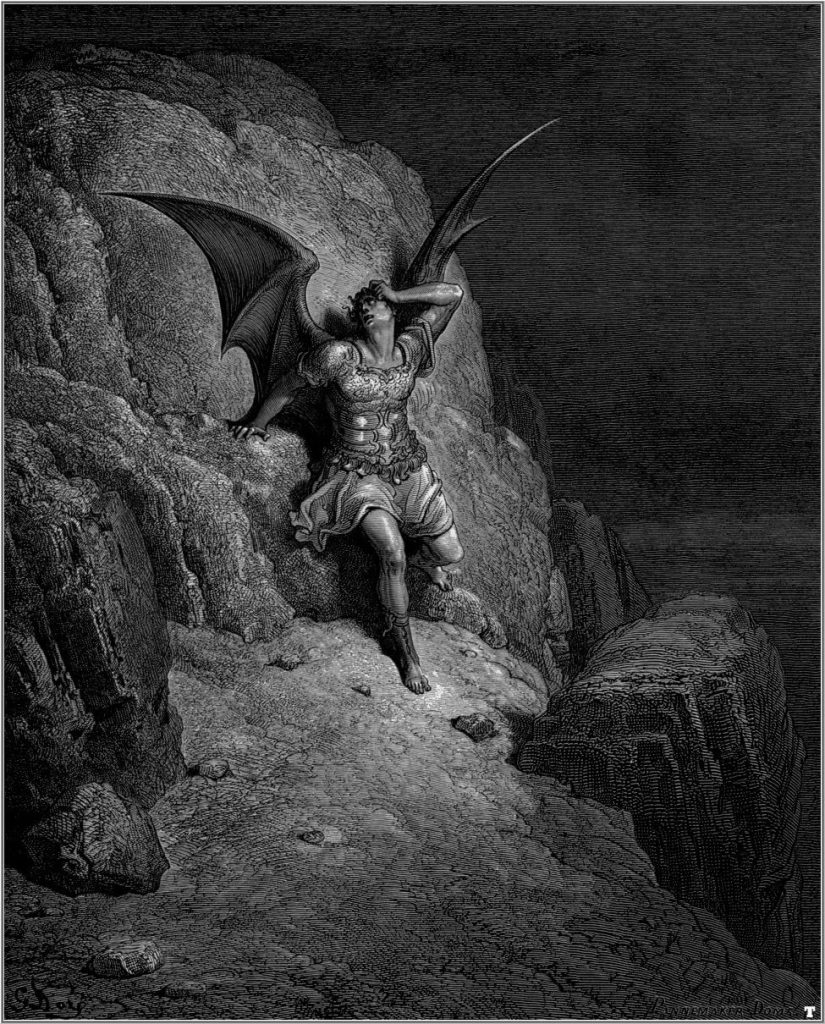In the opening of Book IV of Paradise Lost, Satan sits back and paints a complex, yet totally honest self-portrait. He starts first by establishing his motivations for sinning, creating a logical self-defense, and convincing himself that what he thinks is true. Through this process of reconciliation, Satan reveals just how self-aware he is regarding how he lost paradise. Lastly, through Satan’s final absolute refusal to return to heaven Satan positions himself as a tragic, fallen, anti-hero.

Satan’s soliloquy starts immediately with a tone of regret as he remembers his happy past as every part of the world now only serves to torture him. This is seen when he explains his hatred of the sun, declaring, “O Sun, to tell thee how I hate thy beams / That bring to my remembrance from what state / I fell” (4.37-39). He hates the sun because it reminds him of the warmth of God’s love and what he once had. Looking back to his time in heaven beside God, he seems regretful recalling how God, “Upbraided none; nor was his service hard,” admitting that all he had to do was “afford [God] praise” (4.45-46). But, at this moment of his deepest self-pity, declaring “Me miserable! Which way shall I fly” (4.73) Satan sours, remembering his current pain. Unable to fly from his miserable torture —because it is admittedly self-inflicted— Satan’s sadness turns into a vain attempt at angry bargaining, “O had his powerful destiny ordained / Me some inferior angel, I had stood / Then happy” (4.58-60). In one mind he believes God made him too perfect to be happy in servitude in heaven. Had Satan been “ordained … inferior,” he may not have been tempted to go against God. However, in his other mind, he attempts to justify his betrayal, hypothesizing “Some other power / As great might have aspired” and gone against God as he did (4.61-62). Through this Satan reveals he blames only God for his fall. This conclusion shifts the blame solely on God, and in effect paints Satan as confused. In this final moment of Satan’s sadness—wondering if another would go against God—his jealousy and self-awareness are exposed.
Talking to himself, Satan explains, gradually, how he lost his paradise, showing how he is self-aware regarding his plight. Through his soliloquy, Satan demonstrates that the reasons he fell and refuses to redeem himself are twofold: “Pride and worse Ambition” (4.40). Knowing he is unable to master either, Satan abandons all hope of rejoining God in heaven. Instead, he heartbreakingly says goodbye to everything, “So farewell hope, and with Hope farewell fear, / Farewell remorse: all Good to me is lost; / Evil be thou my Good” (4.108-110). The repetition of “farewell” reads almost regretfully as if Satan must steel himself and work himself up to completely turn his back on God. Dismissing hope, fear, and remorse Satan begins to transform himself into an anti-hero. He is no longer the same as he was 80 lines ago at the start of his soliloquy. He chooses to become Hell declaring, “Which way I fly is Hell; my self am Hell;” (4.75). This is Satan’s moment of great self-awareness and final downfall. Through the speech, he reveals that ambition caused him to fall, but it is his mortal sin of pride that seals the fall. No matter how much he is tormented and torments himself his pride is so strong that nothing can spur him to experience contrition.
In this final way Satan, through his soliloquizing, tries to portray himself as an anti-hero to himself and Man. His final declaration of “Evil be thou my Good” is a complex statement and a purposeful inversion of conventional thought (4.110). Satan decides it is better to work in the name of evil than good, out of spite for God who only works for good. This hints at the subtle wordplay between the similarly sounding “good” and “God,” changing “Evil be thou my Good” to “evil be thou my God” (4.110). Satan through the course of the soliloquy has completely inverted his perception of the world. He here reveals that he would rather purposely fall and live a life that he knows is opposite, rather than live second under God’s glory, fully transforming himself, in his mind, into the anti-hero of Man.
At the start of his speech, Satan seems remorseful of his actions, subtly acknowledging their folly and wishing he could make a change. Through his self-aware nature and intelligence, it is clear he knows that his betrayal is wrong, and that forgiveness is possible. Yet, he purposely, due to his pride, sticks to the path of inversion, where evil is good, to the point of becoming Hell. He inverts convention declaring good and God evil despite knowing he cannot overcome either. He instead chooses the path of the anti-hero, purposely falling, and living outside of God’s glory because he cannot stand to live within it.
Works Cited
- Milton, John. The Complete Poetry and Essential Prose of John Milton. Edited by William Kerrigan et al., Modern Library, 2007.
Leave a Reply